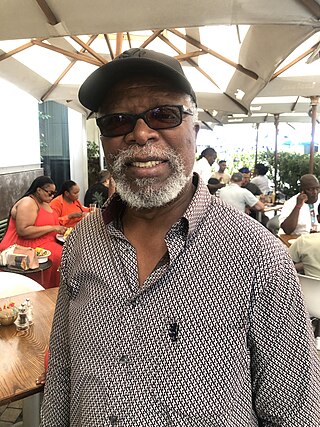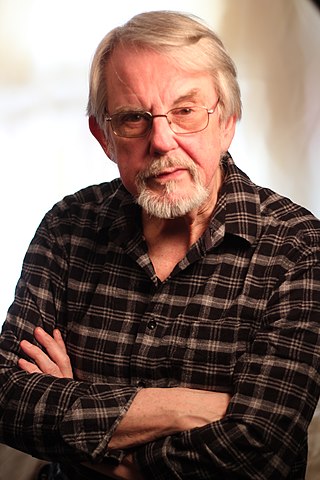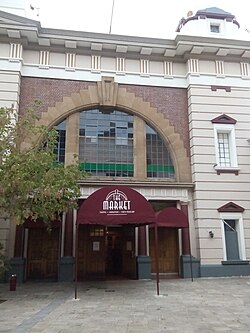
"Master Harold"...and the boys is a play by Athol Fugard. Set in 1950, it was first produced at the Yale Repertory Theatre in March 1982 and made its premiere on Broadway on 4 May at the Lyceum Theatre, where it ran for 344 performances. The play takes place in South Africa during apartheid era, and depicts how institutionalized racism, bigotry or hatred can become absorbed by those who live under it. It is said to be a semi-autobiographical play, as Athol Fugard's birth name was Harold and his boyhood was very similar to Hally's, including his father being disabled, and his mother running a tea shop to support the family. His relationship with his family's servants was similar to Hally's as he sometimes considered them his friends, but other times treated them like subservient help, insisting that he be called "Master Harold", and once spitting in the face of one he had been close to.

Zakes Makgona Mokae was a South African-American actor of theatre and film.
Athol Fugard OIS HonFRSL is a South African playwright, novelist, actor, and director widely regarded as South Africa's greatest playwright. He is best known for his political and penetrating plays opposing the system of apartheid. Some of these have also been adapted for film.
Winston Ntshona was a South African playwright and actor. He won a Tony Award for Best Actor in a Play in 1975.

Bonisile John Kani, OIS, is a South African actor, author, director and playwright. He is known for portraying T'Chaka in the Marvel Cinematic Universe films Captain America: Civil War (2016) and Black Panther (2018), Rafiki in The Lion King (2019) and Colonel Ulenga in the Netflix film Murder Mystery (2019).

Yvonne Bryceland was a South African stage actress. Some of her best-known work was in the plays of Athol Fugard.

The Island is a play written by Athol Fugard, John Kani, and Winston Ntshona.

Sizwe Banzi Is Dead is a play by Athol Fugard, written collaboratively with two South African actors, John Kani and Winston Ntshona, both of whom appeared in the original production. Its world première occurred on 8 October 1972 at the Space Theatre, Cape Town, South Africa. Its subsequent British première won a London Theatre Critics Award for the Best Play of 1974. Its American première occurred at the Edison Theatre, in New York City, on 13 November 1974. It has been ranked among the best plays ever made by The Independent, where it was described as a "deceptively light and humane play that outlasts the apartheid era."
Paul Slabolepszy, or Paul "Slab", is a South African actor and playwright.
Boesman and Lena is a small-cast play by South African playwright Athol Fugard, set in the Swartkops mudflats outside of Port Elizabeth in the Eastern Cape. It features a "Coloured" man and woman walking from one shanty town to another, and explores the effect of apartheid on a few individuals.
The Road to Mecca is a play by South African playwright Athol Fugard. It was inspired by the story of Helen Martins, who lived in Nieu-Bethesda, Eastern Cape, South Africa and created The Owl House, which is now a National heritage site.
Barney Simon NOT to be confused with Jacaranda FM radio DJ Barney Simon, was a South African writer, playwright and director. He was born and died in Johannesburg, South Africa.
The Space Theatre was a fringe theatre in Cape Town, South Africa which was active in the 1970s. It re-opened in late 2008.
Woza Albert! is a satirical South African political play written by Percy Mtwa, Mbongeni Ngema, and Barney Simon in 1981 and first performed at the Market Theatre in Johannesburg. The play is a two-man show that contains 26 vignettes.
The Train Driver is a play by South African playwright Athol Fugard.
Dorothy Mary Benson was a South African civil rights campaigner and author.

Dorkay House is situated on Portion 168 of Farm Turnfontein at 5–7 Eloff Street, Johannesburg, South Africa. It was constructed in 1952 and was designed by architect Colman Segal (1923–1988). It takes its name from the original owner, Dora Kotzen.

Craig Higginson is a novelist, playwright and theatre director based in Johannesburg, South Africa. He has written and published several international plays and novels and won and been nominated for numerous awards in South Africa and Britain.

Brian Astbury was a South African photographer, theatre director, acting and writing teacher, and founder of The Space Theatre in Cape Town, South Africa.

The Fugard Theatre, also known as The Fugard, was opened in the District Six area of Cape Town, South Africa, in February 2010. The Fugard Theatre, as an artistic producing and receiving house, closed permanently in March 2021. After commissioning and underwriting the construction of the theatre in 2009 and 10 years of philanthropic support and producing involvement, the founding producer of the Fugard, Eric Abraham, returned the building that housed the Fugard Theatre complex to its freehold owner, the District Six Museum. The building was handed back with two fully equipped auditoria – the Main Theatre and The Sigrid Rausing Studio – in the hope that it will be able to be used for the financial benefit of the Museum and the memory of District Six and its community. The theatre reopened in 2022 as the District Six Homecoming Centre, a cultural venue for events and theatre productions.











